Back in the Paleozoic Era, Charles Kuralt was the “on the road” reporter for the CBS Evening News. This was decades before he anchored CBS Sunday Morning, and eons before they discovered he had a second family “on the road” in Montana, but that’s another blog.
For a few moments of that time, I was a very witless and unwitting reporter at the CBS affiliate in Sioux Falls, South Dakota.
Kuralt traveled the country looking for interesting little stories in out-of- the-way places, which accounts for why he came through South Dakota more often than not. Any time a Rotary Club got wind that he might be in the area, he was invited to a luncheon. It happened so often that he produced a film about what he did and how he did it, so he wouldn’t have to give the same talk over and over.
The film began with the camera on a distant hillside showing a tiny speck of a motor home, gradually getting larger as it wound its way through the countryside. In due course, Kuralt’s baritone voice explained: “This is how we travel. We go slowly, so as not to miss anything insignificant.”
When we decided to take our first trip to Europe, I had that film in mind and took note of the quirky, unusual and insignificant. If you are looking to me for advice on what to see and where to go, you’re in the wrong blog. Try any of those hundreds of people who travel for free and write books and articles about what they can do and see with unlimited time and money.
We didn’t have that kind of time, or money. Since it was our first time east of West Quoddy Head, we took tours. The first by motor coach (don’t call it a bus) and the next on a ship cruising the Danube.
If you’ve been to Europe, you may have discovered these same things. Or you may not.
It starts in London. Actually, it starts at home. Then Los Angeles and then to London. It took up a good part of that day and half of the next, given the time change. Upon finally approaching Heathrow airport the pilot announced “we will be landing in 30 minutes, local time.” And this the man we had trusted to fly us across the Atlantic.
The line to check our passports was three hours long. The driver who was supposed to meet us left long before that. The next car was more than an hour away, and then was stuck in traffic. Twelve hours from San Diego to London, six hours from the airport to the hotel.
We settled in and went to an Indian restaurant, because, well, English food. American cuisine is an oxymoron, but English food is inedible.
With a day before our tour started, we set out walking. Everywhere we turned, people apologized for the horribly unseasonable weather. It was 74 (23 C), and completely unlivable in an economy reliant on cashmere. People in the UK, as you no doubt know, drive on the left, or wrong, side of the road. People i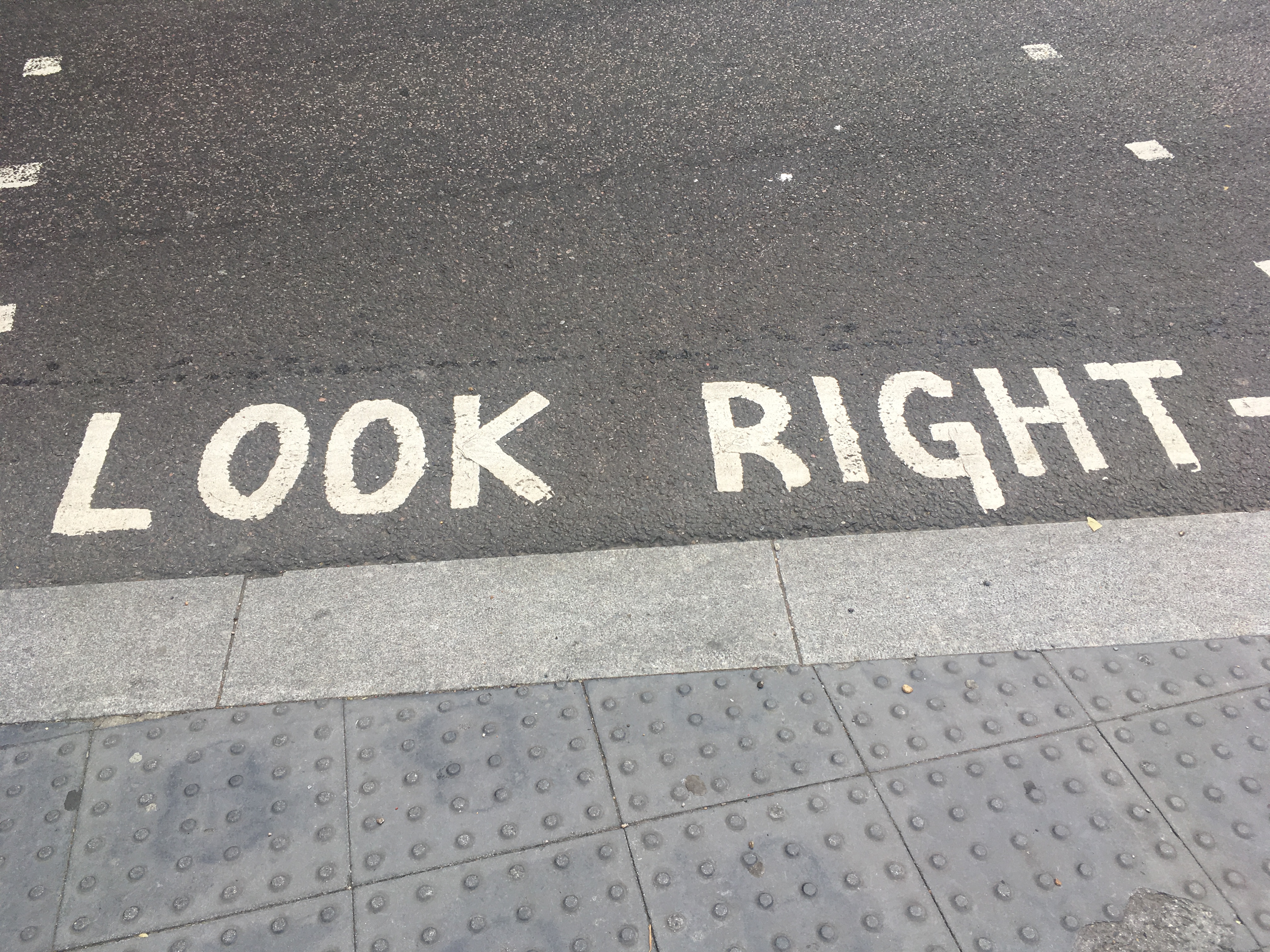 n the rest of Europe, except Malta and Northern Cyprus, drive on the right, or right, side of the road. Since that means tourists and pedestrians from civilized nations are liable to be unjustifiably mowed down right and left, there are helpful painted warnings on the street at many intersections.
n the rest of Europe, except Malta and Northern Cyprus, drive on the right, or right, side of the road. Since that means tourists and pedestrians from civilized nations are liable to be unjustifiably mowed down right and left, there are helpful painted warnings on the street at many intersections.
We stopped at a pub for lunch. I ordered a toastie. A grilled cheese panini covered in butter. It is food in the way a county fair concession stand is a restaurant.
A word about pubs. Do not enter one when Liverpool is playing something called football in something called the Champions League Finals. Hard to find a seat. Hard to hear. Hard to understand why so many people are so interested in something so uneventful.
Forget what you’ve come to believe, no one in England knows how to make a martini. I ordered one and got a glass of dry vermouth on ice.
Ewww.
Having learned, (or learnt, as the Brits would write) I asked for a glass of gin. Never mind the olives and the proper cocktail glass. He poured a gin and tonic. Later in the trip, at a nice restaurant where we stopped for lunch, I gave it one more try.
Me: “Do you make martini cocktails?” Taking no chances to be confused with Martini and Rossi.
She: “No I’m sorry, we don’t.”
Me: “Really.”
She: “Yes, I’m sorry.”
Me: “This is England, right? Winston Churchill? James Bond? Shaken not stirred, all that?”
She: “I’ve heard of that but I don’t know.”
Any true martini drinker knows that stirred is the correct answer, but it is not one that has been practiced in any bar anywhere since Sean Connery uttered the improper directive in 1956. Shaking shatters the ice and dilutes the gin. Stirring gently produces a much better cocktail. Cooling the glass and pouring gin directly into it, better yet. (No matter the recipe, it is only necessary that vermouth be in the same room).
When you order a drink in Europe, by the way, the bartender always asks “single or double?” To them, a single is 25 milliliters, or about enough to coat the bottom of a shot glass. It is carefully measured into a metal thimble and poured from there. Just so you know.
But, about the tour. It’s called A Glimpse of Europe. I called it Blink and You Miss It.
We knew from the start that we were covering a lot of ground in a short time, and it lived up to its billing. Indeed, the first thing the tour director told us, after apologizing for the heat, was that this was the fastest tour the company had.
The next thing he told us was that he was half French and half American and lived in Germany. I don’t know anyone in America who describes their nationality as American. For an American French guy, he had a distinctive Scottish lilt. He introduced our driver as Yani from Slovenia. Or maybe Laurel. We were never sure.
The Glimpse began at 3:15 the first morning so we could have our bags packed and outside the hotel door by 4:15 and leave by 4:45 to catch a ferry across the channel. This was clearly a harbinger of things to come. On the English side, as you may have heard, it’s the English Channel. To the French, it’s la Manche, or the Sleeve. Clearly the English had first choice on naming rights.
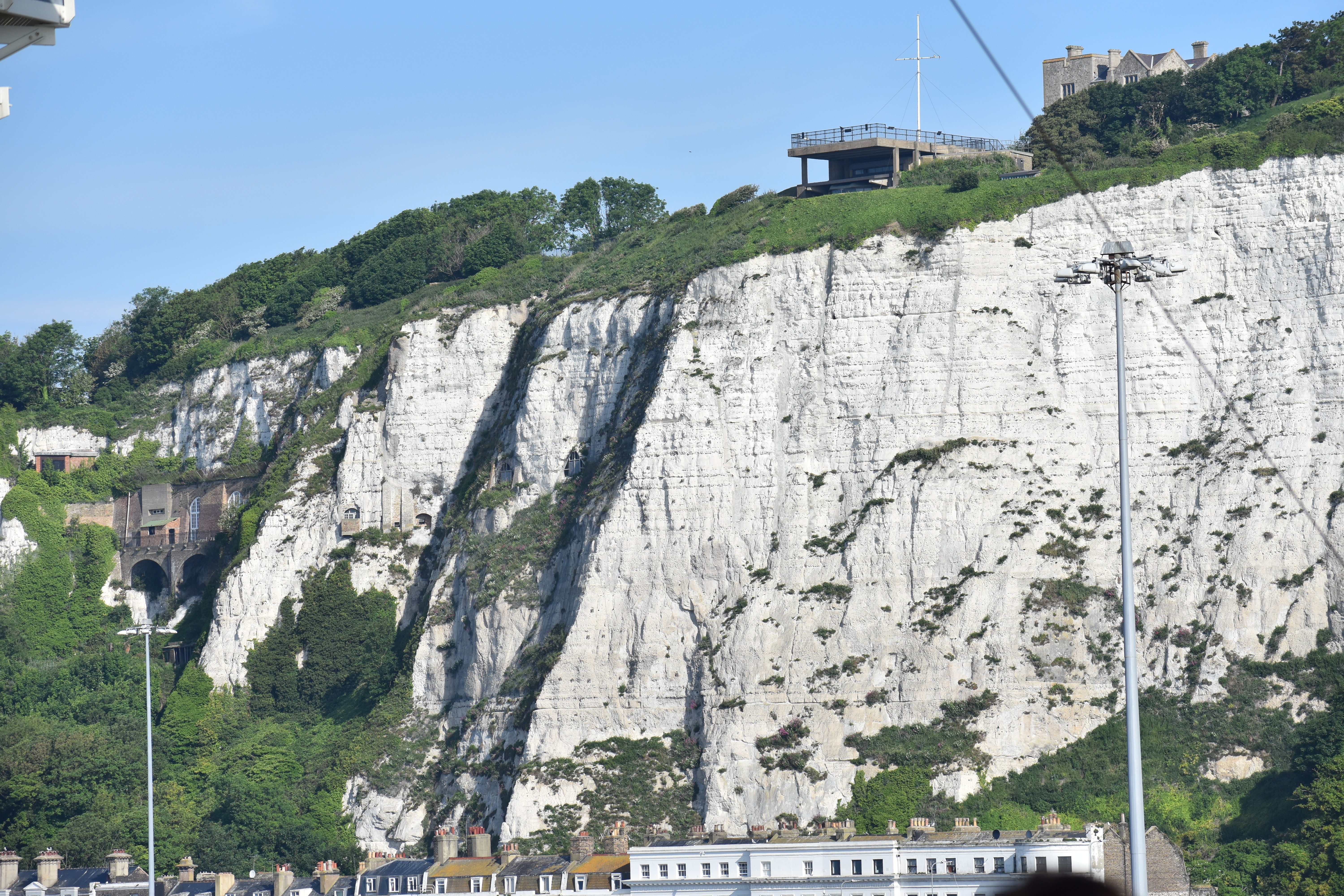
48 people, most strangers to one another, in a coach (don’t call it a bus) on the way to Dover where the cliffs are indeed white, and then on a ferry to Calais, France. We stayed only long enough to have our passports stamped and then drove across northern France, through Belgium, into the Netherlands, stopping just barely occasionally enough to use the facilities, which are known as toilets, or WCs, not restrooms or bathrooms. We always seemed to make these stops at the same time as every other coach (don’t call it a bus) in Europe also stopped at the same place. The women’s line was halfway to Spain, every time.
There are, to my knowledge, exactly three free toilets in all of Europe and they are all at McDonald’s. Elsewhere you will pay something between a half a euro and a euro and ten cents to go to the bathroom. There are times you weigh whether it is worth it.
There were pay toilets in the U.S. up until the 1970’s. Little lock boxes on stalls accepted a dime or a quarter to allow you to enter. They largely disappeared after a couple of high school kids launched a campaign declaring that number one and number two were basic human rights. They got legislators to listen and before you knew it, one state after another outlawed pay toilets.
Apparently, the pay toilet lobby wasn’t as strong as the NRA.
I recall a Burma Shave style poem that drove home the unfairness of paying to poop. Burma Shave was a Minnesota based shaving cream company that posted hundreds of advertising signs around the country in the 40’s, 50’s and 60’s. Six small signs in sequence that added up to rhyming jingles, posted on almost every two-lane highway. My brother and I loved to read them from the back seat, waiting for the punch line as we traveled along. They were things like
Why is it | When you | Try to pass | The guy in front | Goes twice as fast? |
Burma Shave
Car in ditch | Man in tree | The Moon was full | And so | Was he | Burma Shave
The not Burma Shave jingle on pay toilets was
Here I sit | Brokenhearted | Paid to shit | And only farted
That pretty much sums up that discussion.
There were other signs we saw as we traveled by coach (don’t call it a bus) that you wouldn’t see in the U.S. They were generally more easily understood and/or more polite. Yield signs, for instance, look the same, but say “Give Way.” And then there was, “Necessary construction upcoming. Apologies in advance.” Signs pointing to exits in the London Underground say “Way Out.”
Northern France cannot be distinguished from California’s Central Valley. Flat farmland. Belgium is the home of a particular form of waffle, the only sprout named for a capital city and the home of the French fry. Yeah, I know.
They would be called Belgian Fries to this day, perhaps, had they not been served to American soldiers in World War I who didn’t know where they were and called them French fries. Our side, it might be noted, won the war anyway, somehow.
The naming confusion—which could have been avoided altogether had we just followed the British example and called them chips, but, well, English food—did not deter Representative Bob Ney of Ohio from ordering Congressional cafeterias to re-label the menus Freedom Fries after France refused to follow our lead and invade Iraq in 2003. Turns out France was right, of course, and we would have been so much better off to have stayed home and eaten the fries. Ney, by the by, was sent to prison for an unrelated conspiracy.
We finally alighted at a hotel in Amsterdam. As realtors would say, it was “cozy”.
We were there just long enough to get our keys and park our luggage in the room, then back in the coach (don’t call it a bus) to go into the city and take a boat trip on the canals.
Two-thirds of Amsterdam, I learned (or learnt), is ten feet (or three meters) below sea level, so if you want to visit, go soon. Global warming is real. The city is filled with canals and bills itself as “the Venice of the north.” It’s doubtful that anyone has ever called Venice the “Amsterdam of the south.” Obviously, the Dutch canal tourism agency and the French “sleeve” tourism agency have the same marketing firm.
Regardless, it’s an interesting little tour where they point out historic things about the canals and the houses 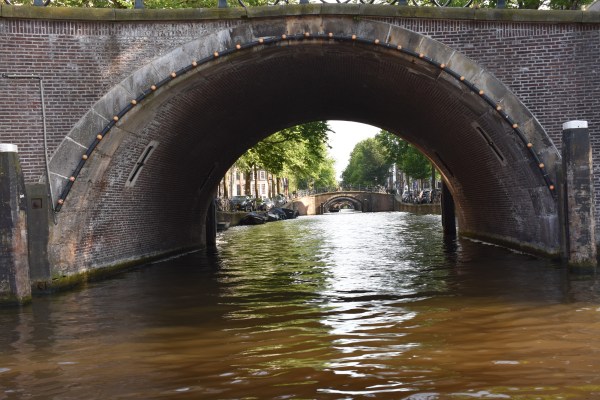 along them, most of which slipped my mind immediately. Then we docked and walked around to see other curious things about the city. The guide was quick to point out that you could buy pot in various forms at coffee shops. If the sign is in
along them, most of which slipped my mind immediately. Then we docked and walked around to see other curious things about the city. The guide was quick to point out that you could buy pot in various forms at coffee shops. If the sign is in 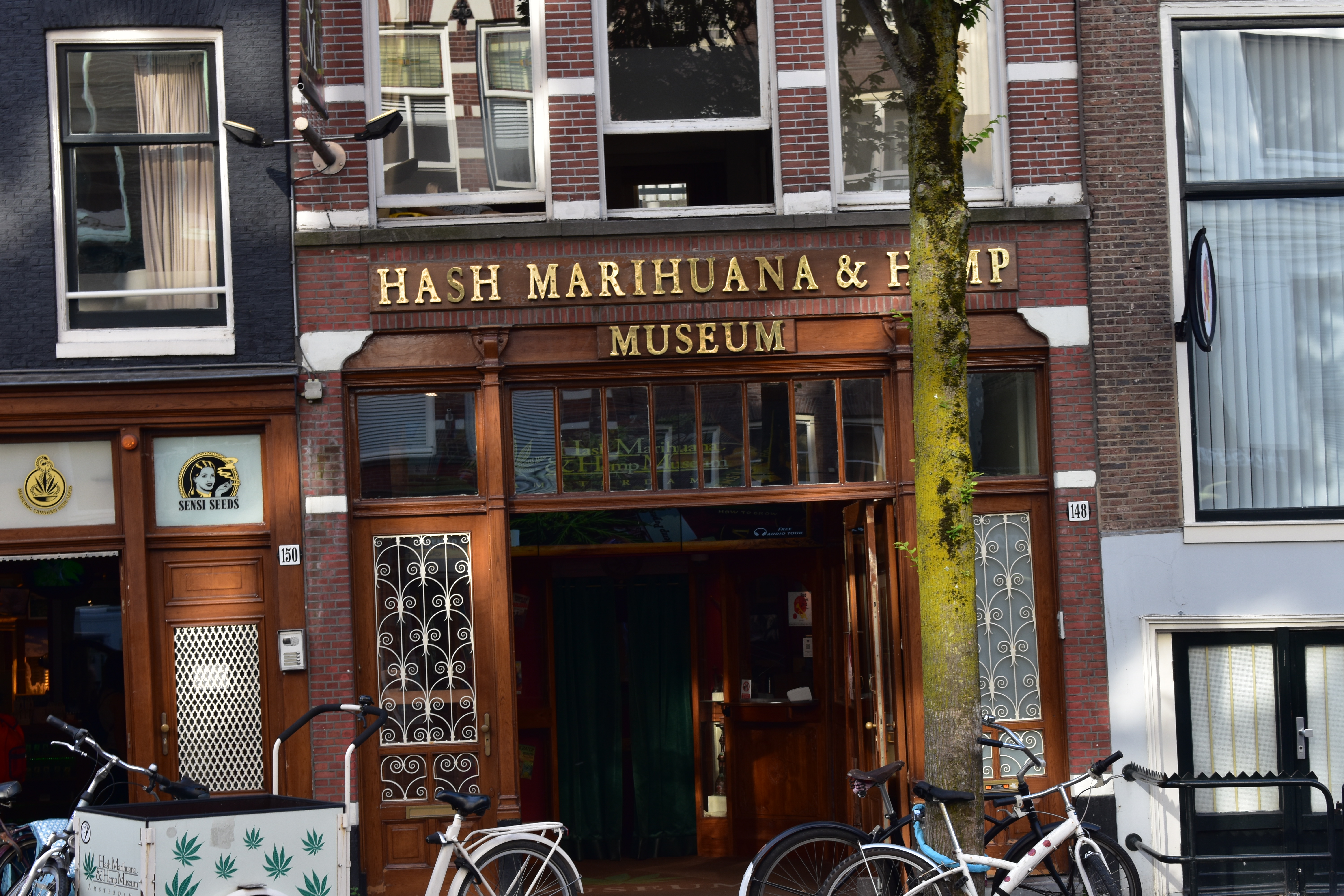 English, there is no coffee pot, just pot. If you actually want coffee, learn Dutch. That may say something about the clientele.
English, there is no coffee pot, just pot. If you actually want coffee, learn Dutch. That may say something about the clientele.
He also walked us through the red-light district. It seemed to me both of these highlights were shown with something of a snicker, as in, “we know you want to see this and isn’t it interesting about this place and oh golly look there’s a girl wearing barely any clothes.” Okay, though I was also interested in maybe a couple of facts along the way, but he was too busy laughing up his sleeve to provide that.
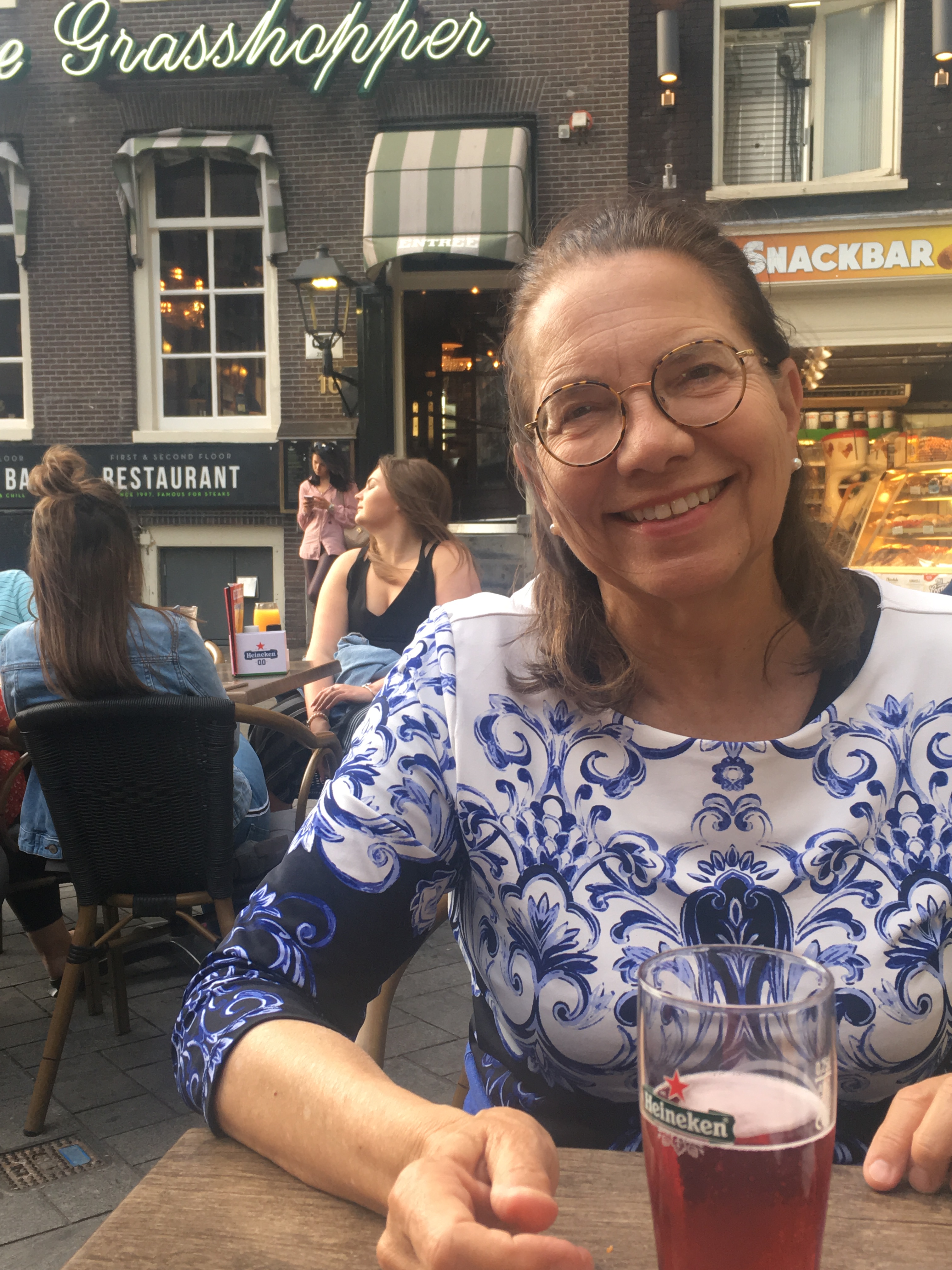 After that we were on our own for dinner and found a restaurant along a canal that served a really good meal, though somewhat inefficiently, unless you like your starter as your dessert. Then we walked around a bit before getting back on the coach (don’t call it a bus) and heading to the hotel.
After that we were on our own for dinner and found a restaurant along a canal that served a really good meal, though somewhat inefficiently, unless you like your starter as your dessert. Then we walked around a bit before getting back on the coach (don’t call it a bus) and heading to the hotel.
By 7:30 the next morning we were on the way to Germany.
The tour director had cautioned us about pick pockets and thieves then told us to put our luggage outside our hotel room door forty-five minutes before we were scheduled to leave. Seemed odd. The airport admonitions about unattended luggage rang in my head.
Nonetheless, we always got our luggage when we got to the next stop.
We stopped in Cologne, Germany before lunch and had some time to look around. The poor, misguided Germans spell Cologne “Koln,” but there wasn’t time to explain it to all of them.
The big feature in Koln Cologne is a huge cathedral that survived several direct bombing hits during World War II. I chose to believe this says more about the accuracy and potency of 1940’s bombs than it does about divine intervention, but much of the surrounding neighborhoods were destroyed by those same bombs, so draw your own conclusions.
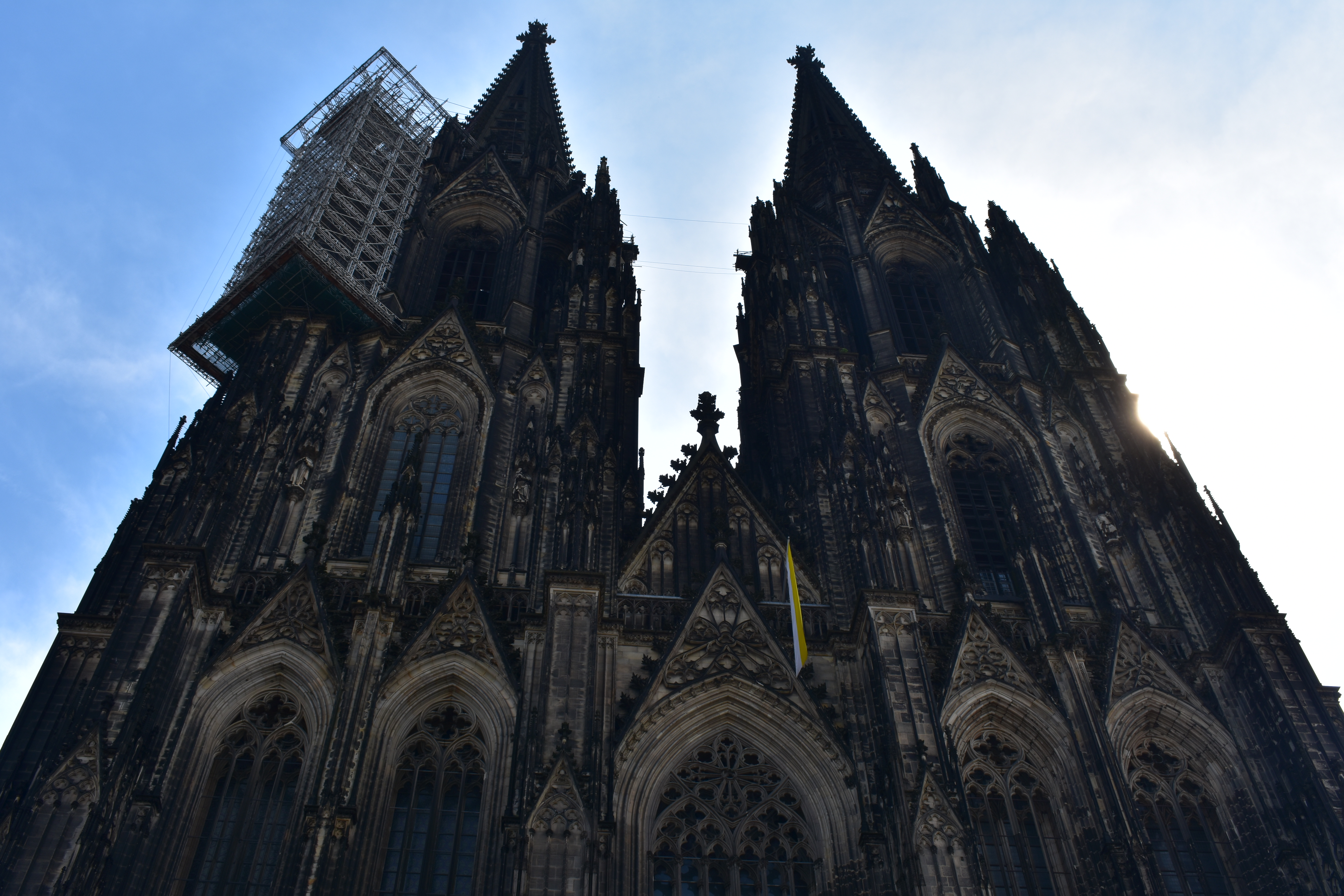 Almost everything old, which is to say almost everything, is covered by scaffolding. Yet, for all of that, never once—not one single time—did we see anyone working on any of that scaffolding. Apparently, they put it up and figure that is good enough. Note to self: Invest in scaffold companies.
Almost everything old, which is to say almost everything, is covered by scaffolding. Yet, for all of that, never once—not one single time—did we see anyone working on any of that scaffolding. Apparently, they put it up and figure that is good enough. Note to self: Invest in scaffold companies.
Since the surrounding neighborhoods were bombed, they are now modern and filled with restaurants and high-end stores in a pedestrian mall that goes on for blocks and blocks. Probably an improvement.
Back in the coach (don’t call it a bus) to wend our way to our destination for the evening. But, not before stopping along the Rhine to take a little boat tour. Lots of ancient castles that could have used some scaffolding.
The Rhine is German wine country, but the boat served beer. It was a pilsner. I had pretty much expected a heavy, dark, warm beer, but what do I know. Apparently nothing.
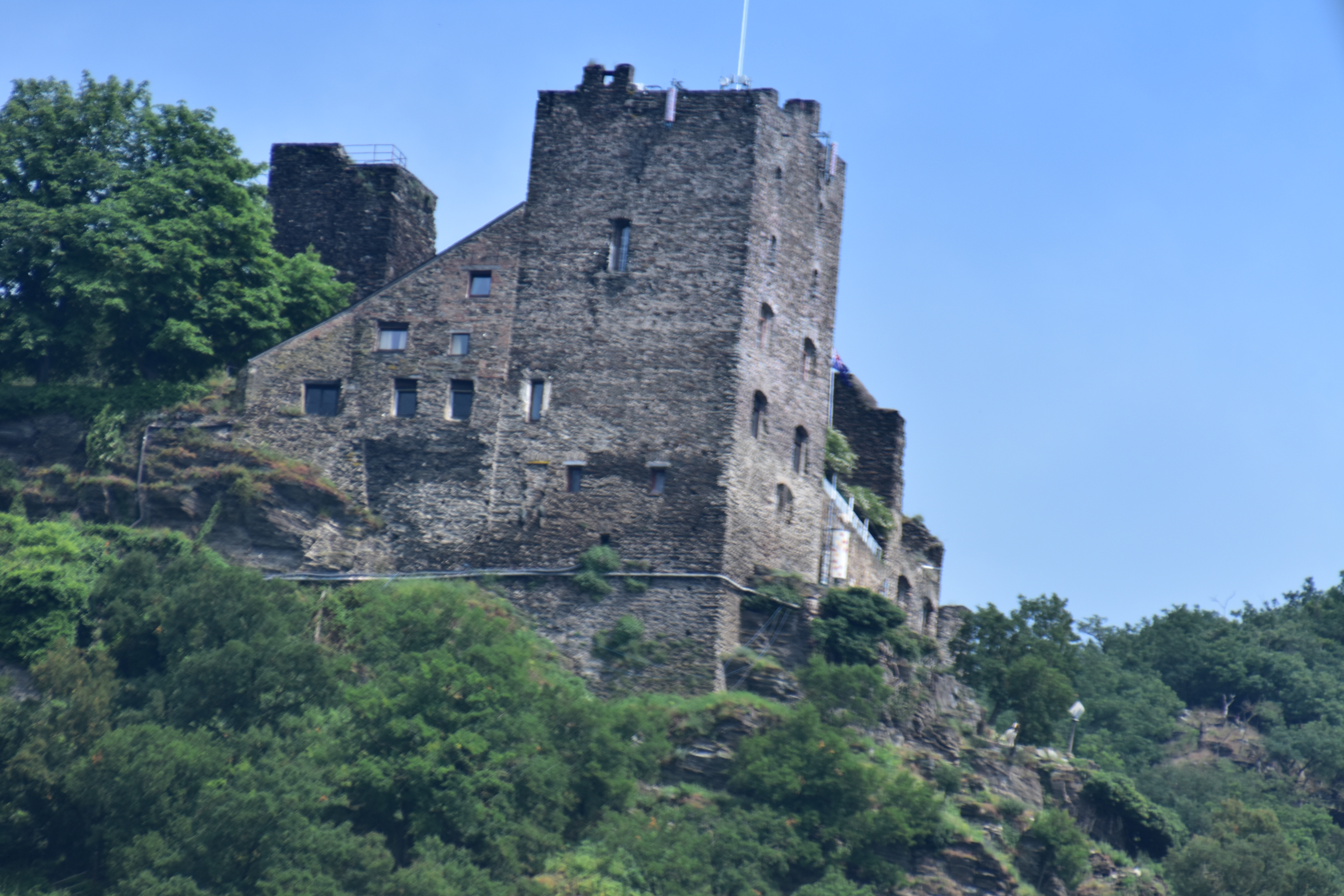
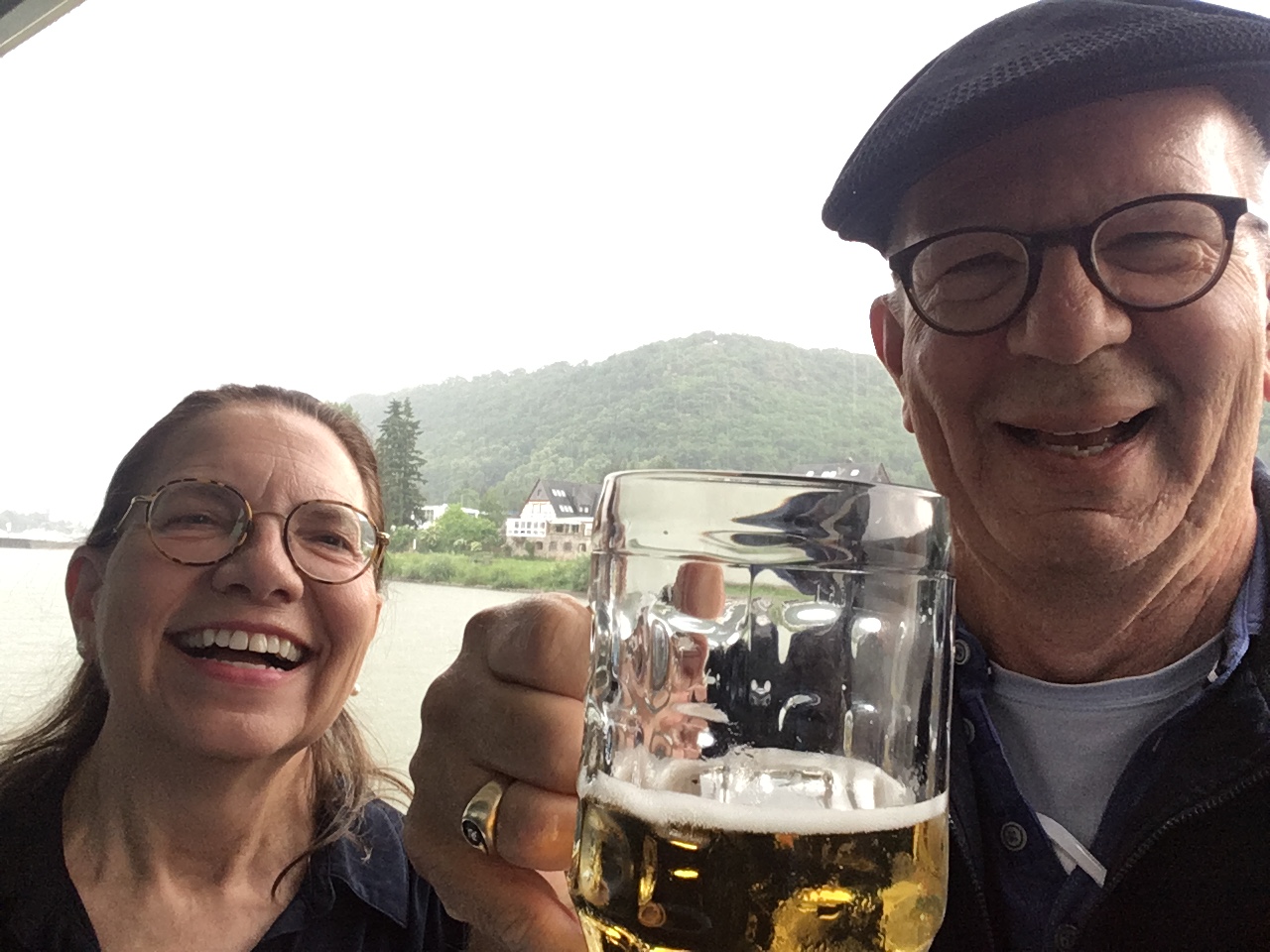
By now we were getting to know some of the people on the tour. There were at least four kids who had graduated from high school and were on the trip as gifts from (and with) their parents. Three Terrys, (two men, one woman); two Brians; the proper allotment of Ashleys; two women from South Africa who understandably said they are afraid to visit the U.S.; two couples on honeymoons; various Canadians; one woman who, like us, is from San Diego; and a couple from Tasmania who took it upon themselves to be the life of the party, with or without a party.
We stopped that night in Neustadt, Germany and, if the first hotel was cozy, this one was petite. I’m not a travel expert, and I said I wouldn’t give advice, but if you have the chance to go to Neustadt, don’t.
As it turns out there was a lot to do the next day on the Fast and Furious 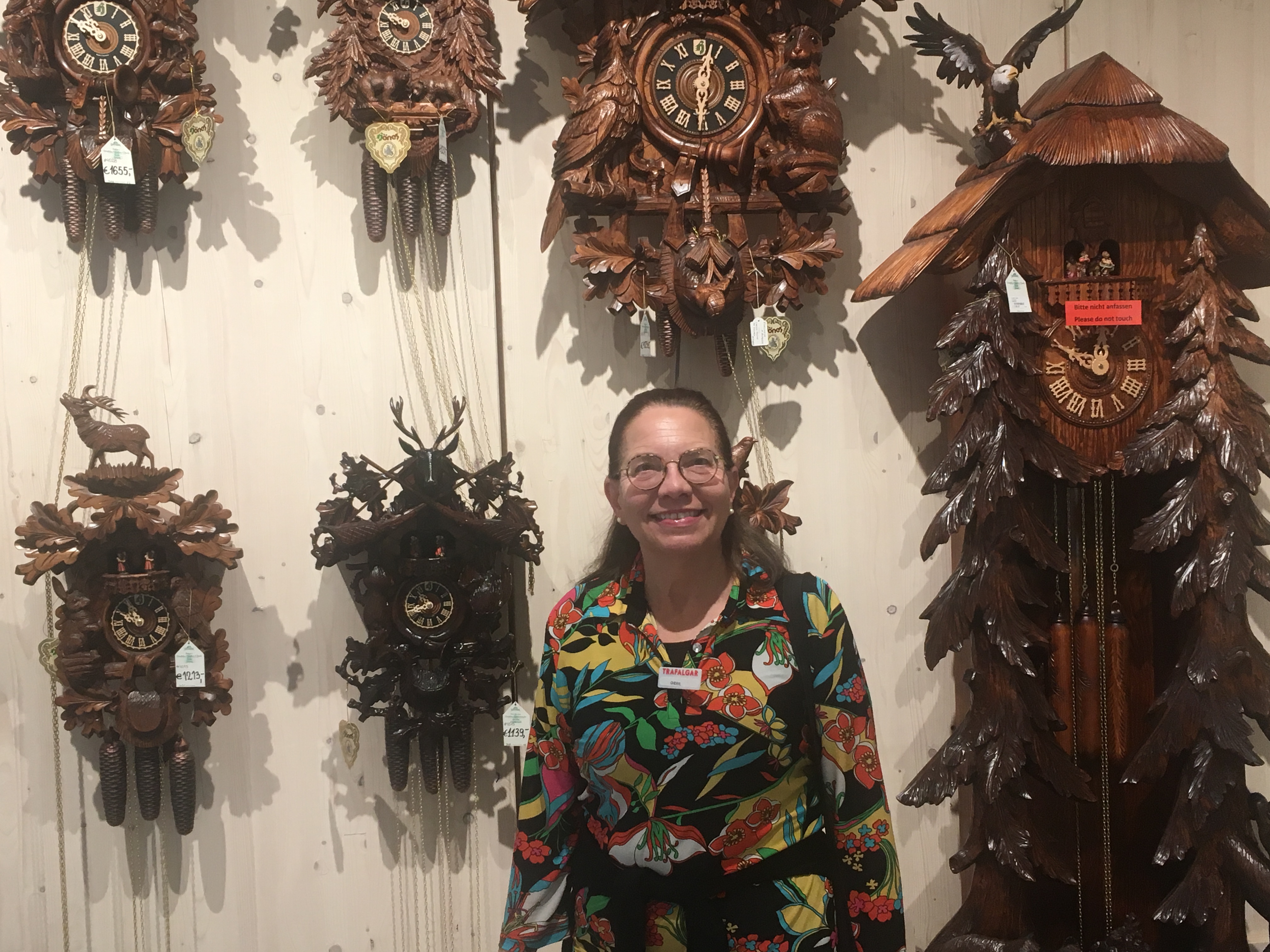 Tour. We stopped for lunch at a place that was also a cuckoo clock store. Very elaborate cuckoo clocks. So-so lunch. And later a stop at Rhein Falls. Not a huge waterfall, but a nice scenic spot.
Tour. We stopped for lunch at a place that was also a cuckoo clock store. Very elaborate cuckoo clocks. So-so lunch. And later a stop at Rhein Falls. Not a huge waterfall, but a nice scenic spot.
And then back in the coach (don’t call it a bus) to get to Switzerland. If I was supposed to feel 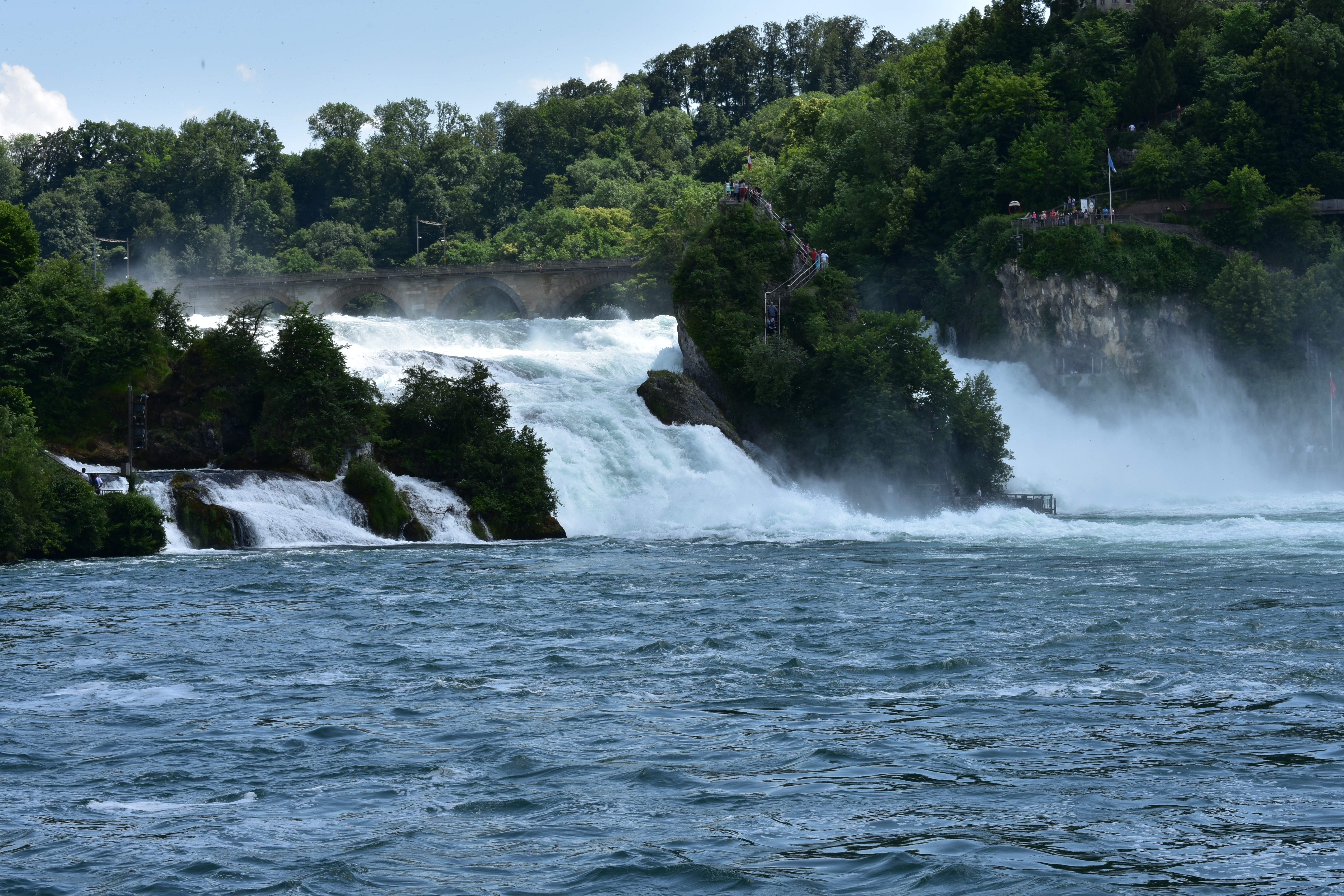 guilty about sleeping because I might miss something, I learnt that the highways are lined with trees so there is nothing to see except asphalt and white lines. There are no Botts dots in Europe, by the way. The highlight of the highway in Germany are the signs that say “Ausfahrt.” It’s not a pay toilet protest thing – it means “exit.” Interesting for an exit or two, but after that, only if you’re twelve.
guilty about sleeping because I might miss something, I learnt that the highways are lined with trees so there is nothing to see except asphalt and white lines. There are no Botts dots in Europe, by the way. The highlight of the highway in Germany are the signs that say “Ausfahrt.” It’s not a pay toilet protest thing – it means “exit.” Interesting for an exit or two, but after that, only if you’re twelve.
We finally arrive at a hotel in Giswill, Switzerland. The tour director, again apologizing because the temperatures were in the seventies, advised that the hotel did not have air conditioning. “Do as we do in Germany, open the windows.” Hey everybody, the Germans invented open windows.
Mark this hotel down as quaint. It appears to get most, if not all, of its business from tour buses.
The first taste of Lucerne, other than the endless blocks of Swiss watch stores, was literally a dinner at a cabaret that included a very loud and noisy music show. I learned I’m not fond of fondue, and that the accordion should be reserved for prisoner of war camps, along with its dumb little cousin, the concertina. Everyone was much too jolly and ear-splittingly loud. I’m not making value judgments, just. . .oh come on, who am I kidding, I’m making value judgments. It sucked.
Switzerland is beautiful. If it were always 78 (25 C) we would have bought property, though the Centigrade thing would be a deal breaker. It’s one of nine countries in the EU that doesn’t use the Euro, though every shop and restaurant accept them. They just give change in Swiss francs which turn into worthless souvenirs because they aren’t welcome anywhere else.
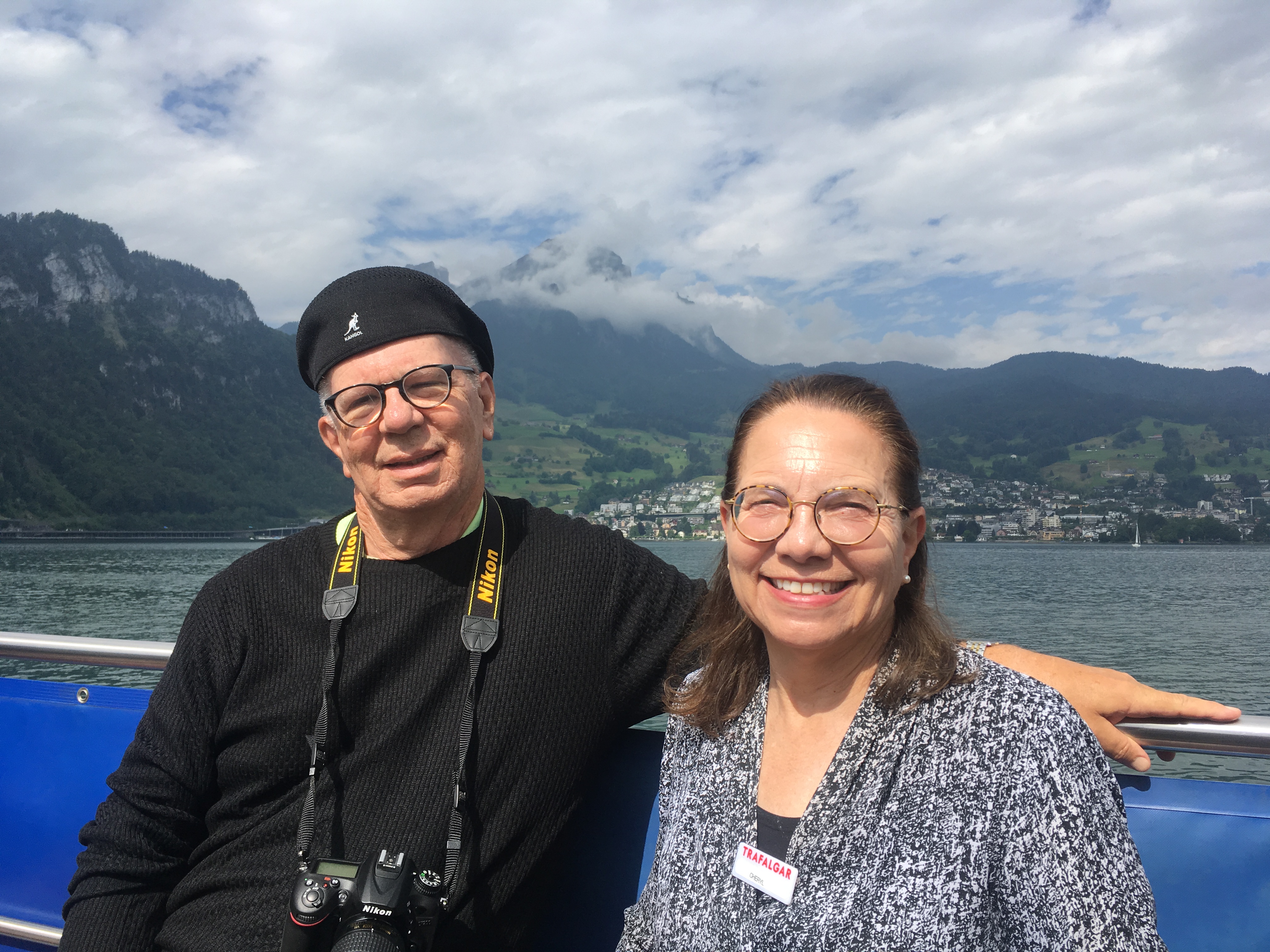 We took a boat across Lake Lucerne to get to the base of Mt. Pilatus, which, despite what you might assume, is not the place where Pilates was invented. (One day, take the time to read the Wikipedia entry on Pilates. It essentially says Pilates doesn’t live up to any of its claims for improving health and fitness and is only slightly better than doing nothing.)
We took a boat across Lake Lucerne to get to the base of Mt. Pilatus, which, despite what you might assume, is not the place where Pilates was invented. (One day, take the time to read the Wikipedia entry on Pilates. It essentially says Pilates doesn’t live up to any of its claims for improving health and fitness and is only slightly better than doing nothing.)
Mt. Pilatus, on the other hand, lays claim to having the steepest cog wheel railway in the world. The distinction is important apparently. Stoos has a steeper funicular. Some place in Katoomba Australia has a steep railway, but no place has a steeper cog wheel railway. So there. We took a gondola down, 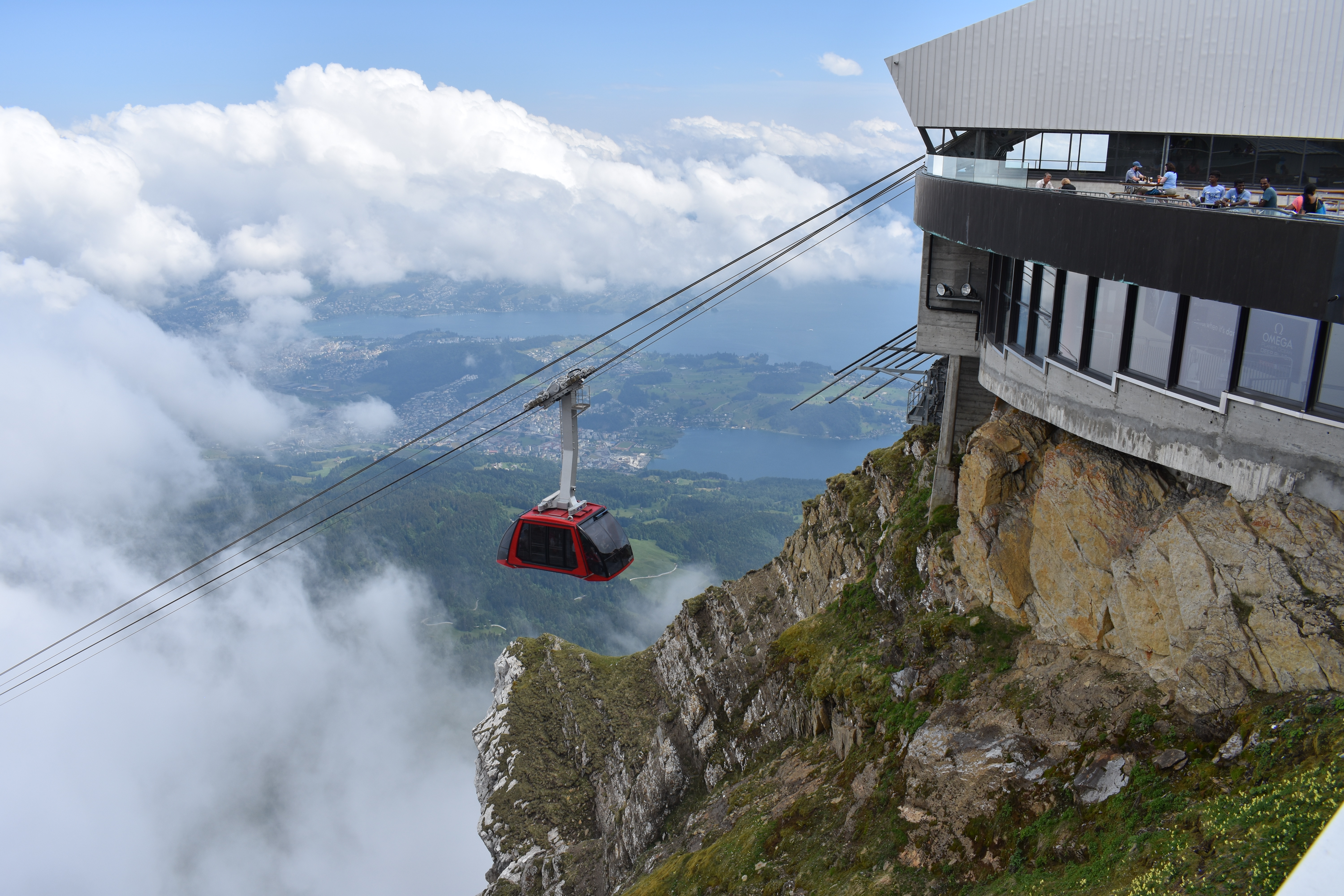 which had nothing to distinguish itself, other than its somewhat perilous route. At the top of the mountain, nothing but gorgeous green Switzerland.
which had nothing to distinguish itself, other than its somewhat perilous route. At the top of the mountain, nothing but gorgeous green Switzerland.
At 7:15 the next morning we were off to Paris, which, I learnt, is in France.
Only one thing stands out from the coach (don’t call it a bus) ride to Paris. That’s the vending machine at the rest stop that sold “Cannabis Iced Tea.” It was €2.50. Coca Cola was €3.00. I didn’t have correct change, because the machine didn’t accept Swiss francs.
Something else that’s handy to know. In most buildings, the first floor is the ground floor and the second floor is the first floor. And so on, making the thirteenth floor the twelfth floor unless they don’t count the thirteenth floor in which case the fourteenth floor is the twelfth floor, or the twelfth floor is the fourteenth, depending upon which way you’re counting.
It was Paris where the Blink and You Miss It tour really earned its name. We checked in to the hotel and immediately left for a boat trip on the Seine. Along the way the tour director pointed out the Eiffel Tower on the right and, a little farther on, the Arc de Triomphe on the left. Moving right along. The boat tour wasn’t much better, cruising past the Musee Orsay, the Louvre, and Notre Dame. We of course could only see the upper two-thirds of the buildings because we were beneath them on the water.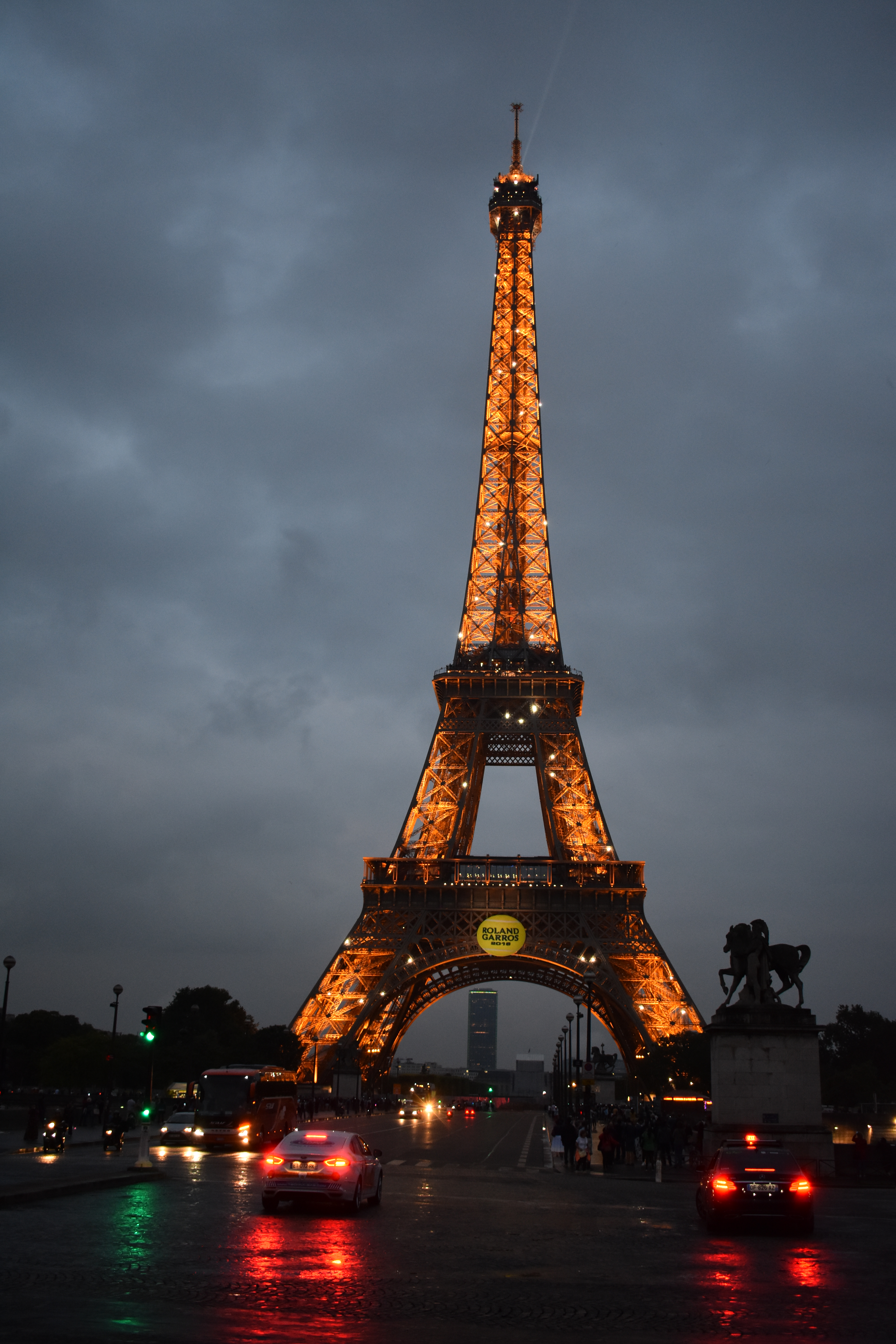
The only saving grace was that on the way back to the hotel, we stopped in front of the lighted Eiffel Tower long enough to take some pictures.
The next morning, we took a driving tour of the city in the coach (don’t call it a bus). It was just as quick. All I remember was a restaurant that advertised “Original French Tacos.” Shameful.
That evening, we ditched the group and found a small French country restaurant for a very nice, relaxing dinner.
The next morning, we headed back to London and the end of the tour.
But not the end of our trip. It is, by the way, a trip, because when you’re retired you don’t take vacations. Every day is a vacation. So, if you go anywhere, you go on a trip. More about the rest of the trip, in part two.







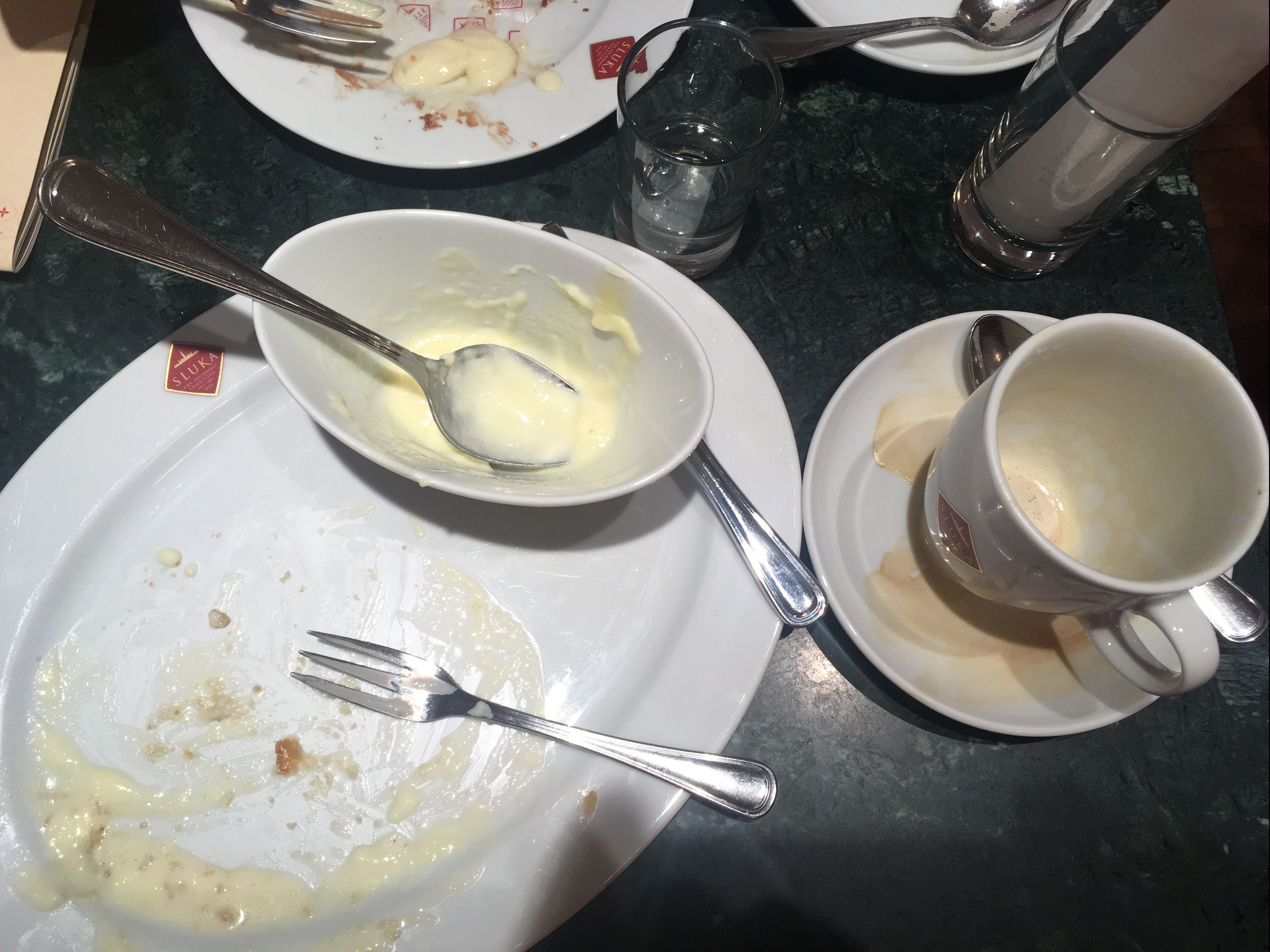 There may, however, be Marie Antoinette cake. But I ordered the apple strudel, with vanilla sauce. I meant to take a picture of it. Honestly.
There may, however, be Marie Antoinette cake. But I ordered the apple strudel, with vanilla sauce. I meant to take a picture of it. Honestly.

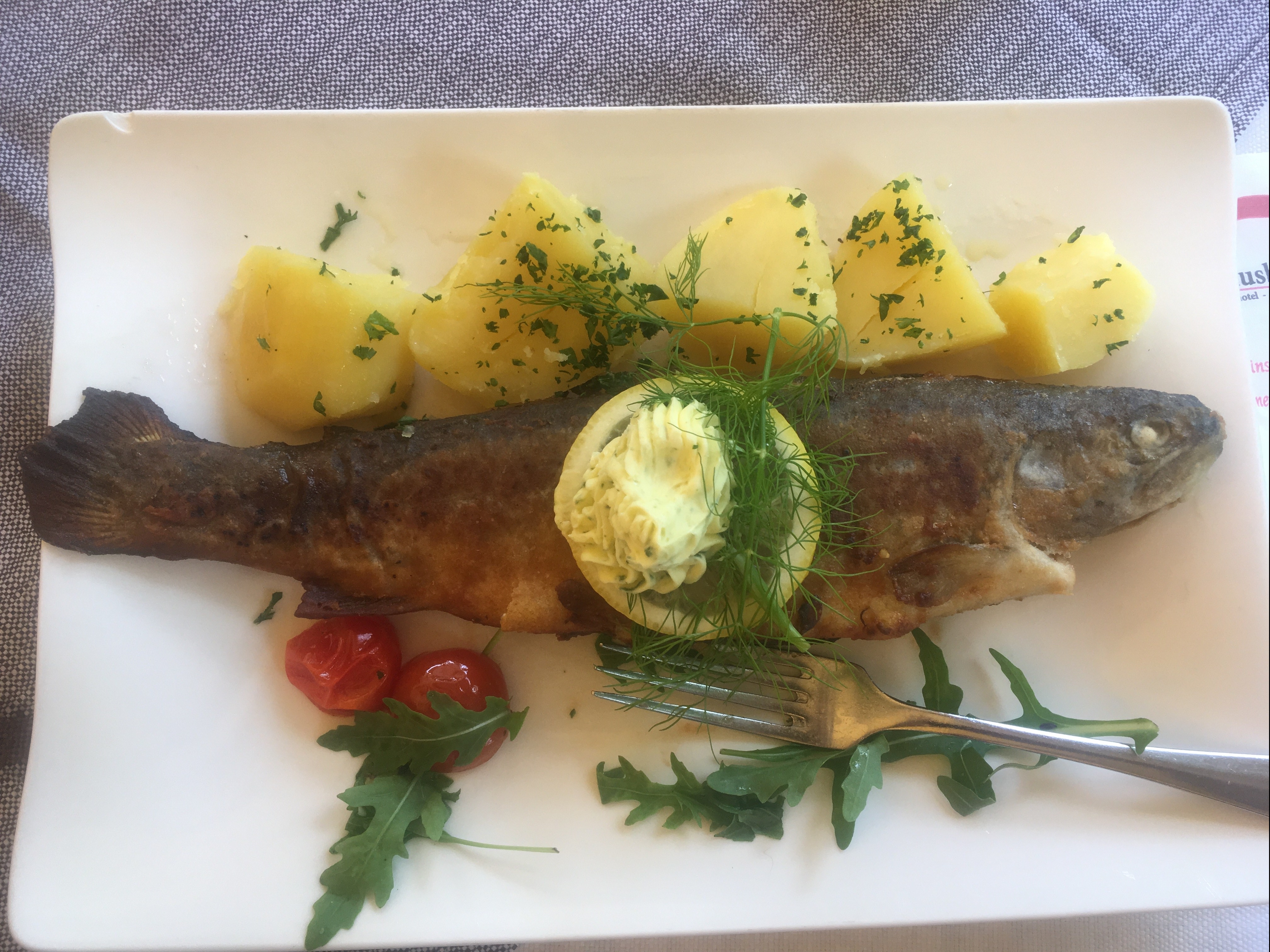

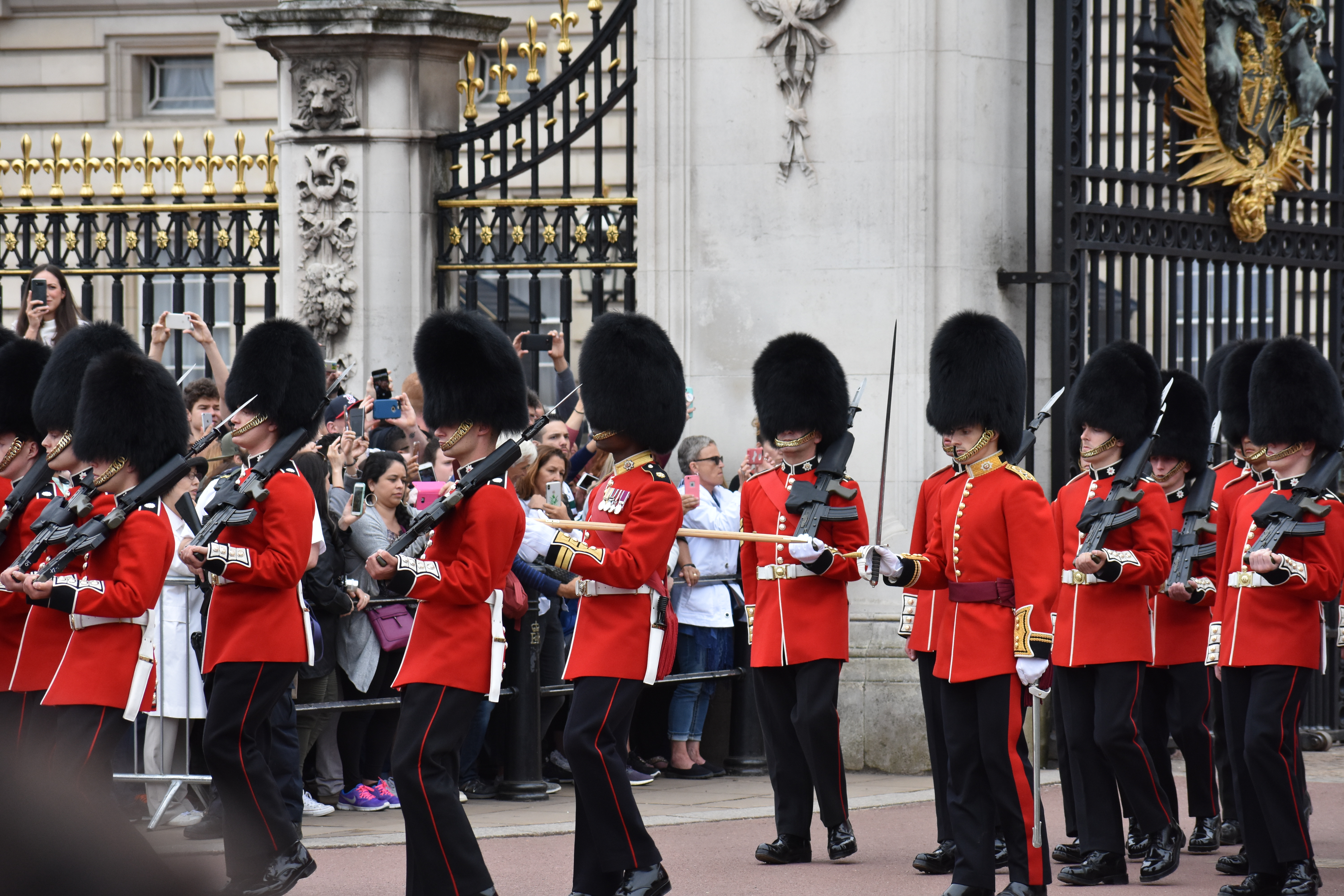
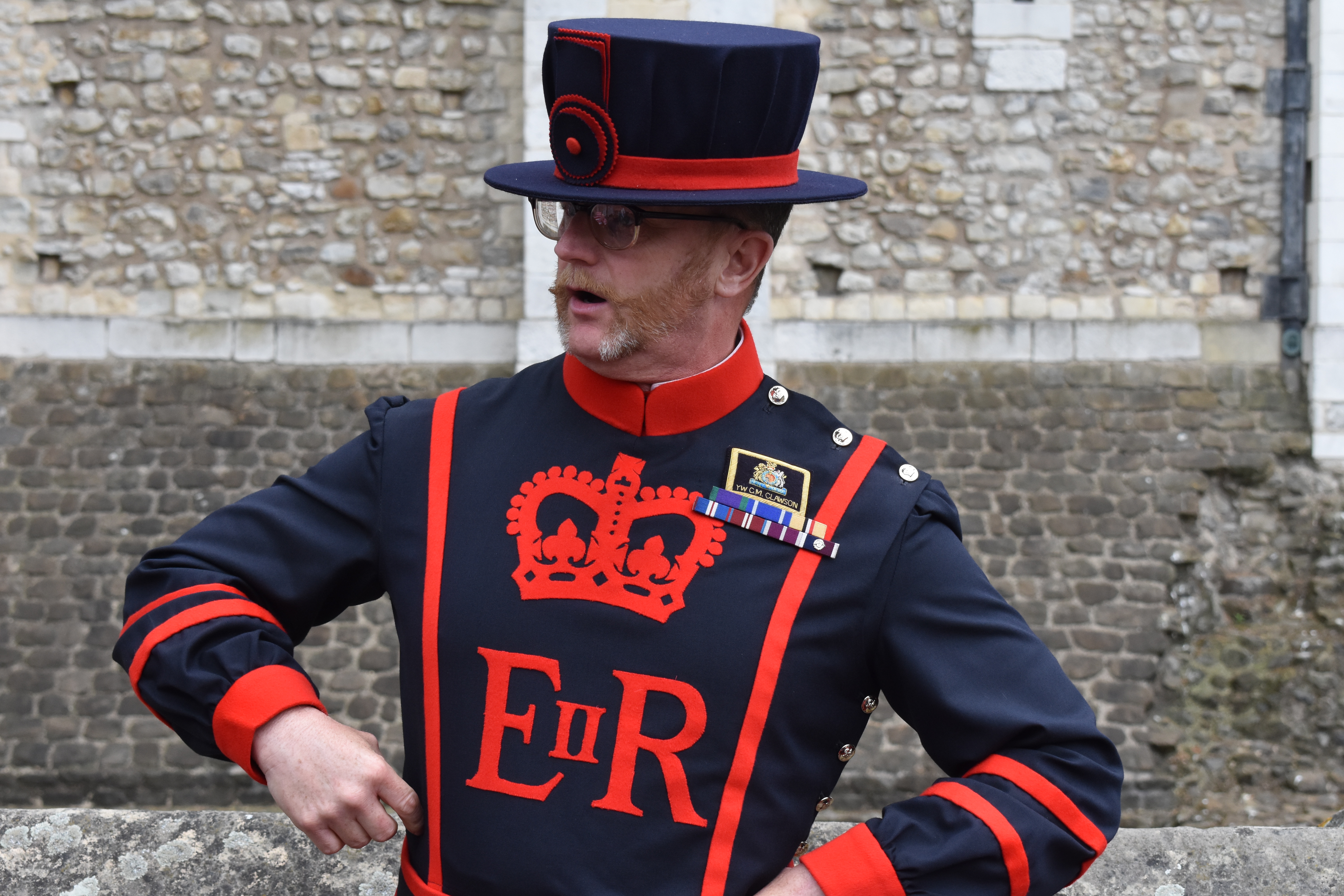
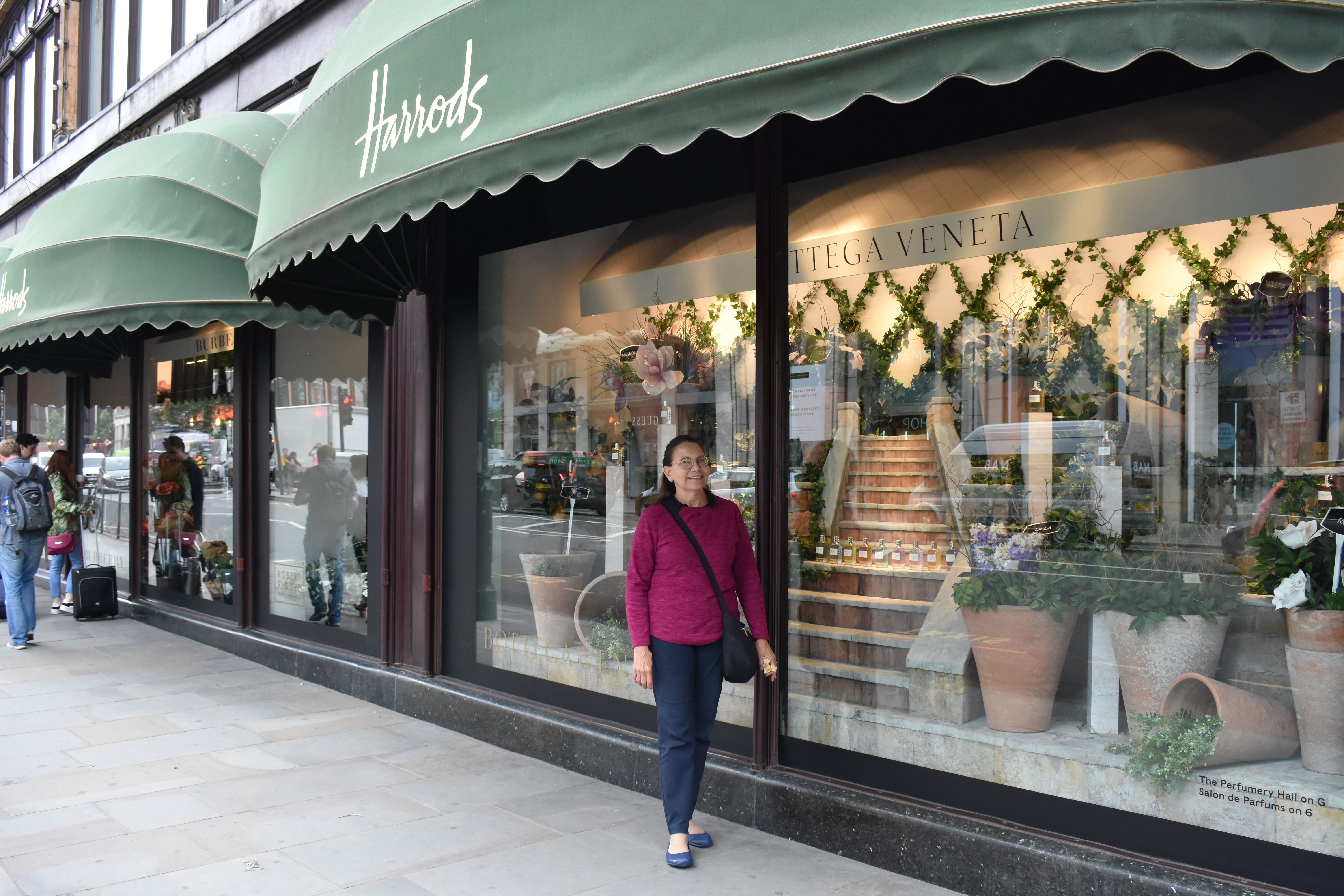

 n the rest of Europe, except Malta and Northern Cyprus, drive on the right, or right, side of the road. Since that means tourists and pedestrians from civilized nations are liable to be unjustifiably mowed down right and left, there are helpful painted warnings on the street at many intersections.
n the rest of Europe, except Malta and Northern Cyprus, drive on the right, or right, side of the road. Since that means tourists and pedestrians from civilized nations are liable to be unjustifiably mowed down right and left, there are helpful painted warnings on the street at many intersections. 
 along them, most of which slipped my mind immediately. Then we docked and walked around to see other curious things about the city. The guide was quick to point out that you could buy pot in various forms at coffee shops. If the sign is in
along them, most of which slipped my mind immediately. Then we docked and walked around to see other curious things about the city. The guide was quick to point out that you could buy pot in various forms at coffee shops. If the sign is in  English, there is no coffee pot, just pot. If you actually want coffee, learn Dutch. That may say something about the clientele.
English, there is no coffee pot, just pot. If you actually want coffee, learn Dutch. That may say something about the clientele. After that we were on our own for dinner and found a restaurant along a canal that served a really good meal, though somewhat inefficiently, unless you like your starter as your dessert. Then we walked around a bit before getting back on the coach (don’t call it a bus) and heading to the hotel.
After that we were on our own for dinner and found a restaurant along a canal that served a really good meal, though somewhat inefficiently, unless you like your starter as your dessert. Then we walked around a bit before getting back on the coach (don’t call it a bus) and heading to the hotel. Almost everything old, which is to say almost everything, is covered by scaffolding. Yet, for all of that, never once—not one single time—did we see anyone working on any of that scaffolding. Apparently, they put it up and figure that is good enough. Note to self: Invest in scaffold companies.
Almost everything old, which is to say almost everything, is covered by scaffolding. Yet, for all of that, never once—not one single time—did we see anyone working on any of that scaffolding. Apparently, they put it up and figure that is good enough. Note to self: Invest in scaffold companies.

 Tour. We stopped for lunch at a place that was also a cuckoo clock store. Very elaborate cuckoo clocks. So-so lunch. And later a stop at Rhein Falls. Not a huge waterfall, but a nice scenic spot.
Tour. We stopped for lunch at a place that was also a cuckoo clock store. Very elaborate cuckoo clocks. So-so lunch. And later a stop at Rhein Falls. Not a huge waterfall, but a nice scenic spot. guilty about sleeping because I might miss something, I learnt that the highways are lined with trees so there is nothing to see except asphalt and white lines. There are no Botts dots in Europe, by the way. The highlight of the highway in Germany are the signs that say “Ausfahrt.” It’s not a pay toilet protest thing – it means “exit.” Interesting for an exit or two, but after that, only if you’re twelve.
guilty about sleeping because I might miss something, I learnt that the highways are lined with trees so there is nothing to see except asphalt and white lines. There are no Botts dots in Europe, by the way. The highlight of the highway in Germany are the signs that say “Ausfahrt.” It’s not a pay toilet protest thing – it means “exit.” Interesting for an exit or two, but after that, only if you’re twelve. We took a boat across Lake Lucerne to get to the base of Mt. Pilatus, which, despite what you might assume, is not the place where Pilates was invented. (One day, take the time to read the Wikipedia entry on Pilates. It essentially says Pilates doesn’t live up to any of its claims for improving health and fitness and is only slightly better than doing nothing.)
We took a boat across Lake Lucerne to get to the base of Mt. Pilatus, which, despite what you might assume, is not the place where Pilates was invented. (One day, take the time to read the Wikipedia entry on Pilates. It essentially says Pilates doesn’t live up to any of its claims for improving health and fitness and is only slightly better than doing nothing.) which had nothing to distinguish itself, other than its somewhat perilous route. At the top of the mountain, nothing but gorgeous green Switzerland.
which had nothing to distinguish itself, other than its somewhat perilous route. At the top of the mountain, nothing but gorgeous green Switzerland. 